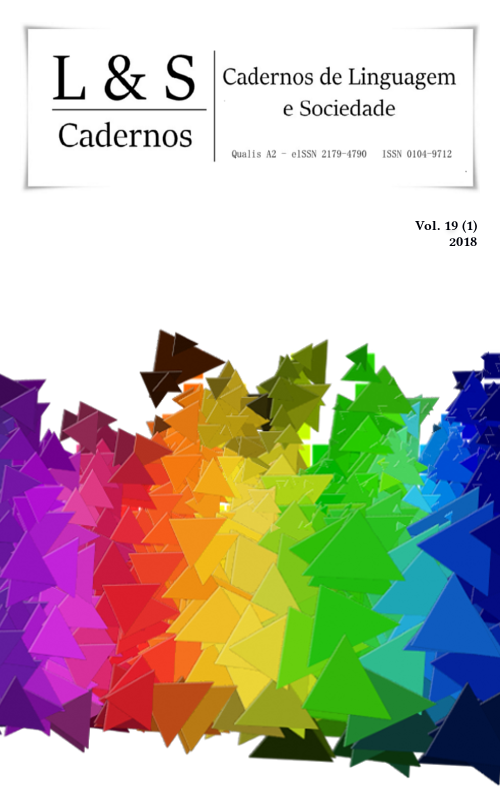I’m a feminist because…: the discourse in the process of (re)configuration of feminist gender identities
DOI:
https://doi.org/10.26512/les.v19i1.10874Keywords:
Identidades; Mulheres Feministas; Discursos.Abstract
This paper aims to analyze how the feminist collective SlutWalk Distrito Federal (Marcha das Vadias Distrito Federal) mobilizes the discourses in social practices with the objective of creating tensions between fixed and unchanging gender identities, made available by hegemonic discourses, and a more fluid notion of plastic identities, shaped according to social practices. To that end, we will perform the analysis of the visual composition (KRESS; VAN LEEUWEN, 2006) and the recurrent linguistic traits (MARTIN; WHITE, 2005; PARDO, 2011; HALLIDAY; MATTHIESSEN, 2014) in 46 posters produced for the campaign Feminist Why? We based our study on the theoretical-methodological contributions of Critical Discourse Analysis (CHOULIARAKI; FAIRCLOUGH, 1999; FAIRCLOUGH, 2001; 2003; 2010).
Downloads
References
BAKHTIN, Mikail. Marxismo e filosofia da linguagem. São Paulo: Hucitec, 1997.
BAUMAN, Zygmunt. Modernidade Líquida. Rio de Janeiro: Jorge Zahar Ed. 2001.
BUTLER, Judith. Problemas de gênero: feminismo e subversão da identidade. Civilização Brasileira: Rio de Janeiro: 2003.
CARR, J. L. ‘The SlutWalk Movement: A Study in Transnational Feminist Activism’, Journal of Feminist Scholarship, 4 (Spring), 24”“ 38, 2013.
CASTILHO, Ataliba. Demonstrativos. In: ILARI, Rodolfo (Org.). Gramática do Português Culto Falado no Brasil: palavras de classe fechada. Vol. IV. São Paulo: Contexto, 2015.
CHOULIARIAKI, Lilie; FAIRCLOUGH, Norman. Discourse in late modernity: rethinking critical discourse analysis. Edinburgh: Edinburgh University Press, 1999.
FAIRCLOUGH, Norman. Discurso e mudança social. Brasília: Editora Universidade de Brasília, 2001 [1992].
FAIRCLOUGH, Norman. Analysing discourse: textual analysis for social research. London, Nova York: Routledge, 2003.
FAIRCLOUGH, Norman. Critical Discourse Analysis: the critical study of language. London: Longman Group Limited, 2010.
GENZ, S.; BRABON, B. A. Postfeminism: Cultural Texts and Theories. Edinburgh: University of Edinburgh Press, 2009.
GOMES, Carla; SORJ, Bila. Corpo, geração e identidade: a Marcha das vadias no Brasil. Revista Sociedade e Estado, Vol. 29, Nº 2 (Maio/Agosto), p. 433-447, 2014.
GUIDDENS, Anthony. As conseqüências da modernidade. Tradução: Raul Fiker. São Paulo: Editora UNESP, 1991.
HALL, Stuart; DU GAY, Paul (Eds.). Questions of Cultural Identity. London: Sage Publications, 1996.
HALL, Stuart. A identidade na pós-modernidade. Rio de Janeiro, DP&A, 2005.
HALLIDAY, Michael; MATTHIESSEN, Christian. Halliday’s Introduction to Functional Grammar. Fourth Edition. Abington/New York: Routledge, 2014.
ILARI, Rodolfo; BASSO, Renato Miguel. Advérbios verificadores. In: ILARI, Rodolfo (Org.). Gramática do Português Culto Falado no Brasil: palavras de classe aberta. Vol. III. São Paulo: Contexto, 2014
JEWITT, Carey; OYAMA, Rumiko. Visual meaning: a social semiotic approach. In: VAN LEEUWEN, Theo; JEWITT, Carey (Orgs.). Handbook of Visual Analysis. London: Sage Publications, 2008, p. 134-156.
KIMBLE, James J.; OLSON, Lester C. Visual Rhetoric Representing Rosie the Riverter: Myth and Misconception in J. Howard Miller’s “We Can Do It!” Poster. Rethoric and Public Affairs, Vol. 9. Nº 4 (Winter 2006), p. 533-569, 2006.
KRESS, Gunther; VAN LEEUWEN, Theo. Reading Images: the grammar of visual design. London/New York: Routledge, 2006.
KWAN, R. ‘Don’t Dress Like a Slut: Toronto Cop’, Excalibur, 8 February 2011.
MAGALHÃES, Izabel. Discursos e identidades de gênero na alfabetização de jovens e adultos e no Ensino Especial. Calidoscópio, 6(2): 62-68, 2008.
MARTIN, J. R.; WHITE, P. R. R. The language of evaluation. New York: Palgrave Macmillan, 2005.
MCNICOL, L. SlutWalk is “Kind of Like Feminism”: A Critical Reading of Canadian Mainstream News Coverage of SlutWalk’, MA Thesis (Kingston: Queens University), 2012.
MENDES, Kaitlynn. Slutwalk: feminism, activism and media. London/New York: Palgrave, 2015.
PAGANO, A. A pragmatic study of negatives in written text. MA diss., Florianópolis: Universidade Ferderal de Santa Catarina, 1991.
PARDO María Laura. Teoría y metodologia de la investigación lingüística. Método sincrônico-diacrónico de análisis lingüístico de textos. Buenos Aires: Tersites, 2011.
VECCHI, Benedetto. Introdução. In: BAUMAN, Zygmunt. Identidade: entrevista a Benedetto Vecchi. Tradução: Carlos Alberto Medeiros. Rio de Janeiro: Jorge Zahar Ed., 2005.
WOODWARD, K. Concepts of identity and difference. In: WOODWARD, K. (Org.). Identity and difference. London: Sage Publications, 2002.



